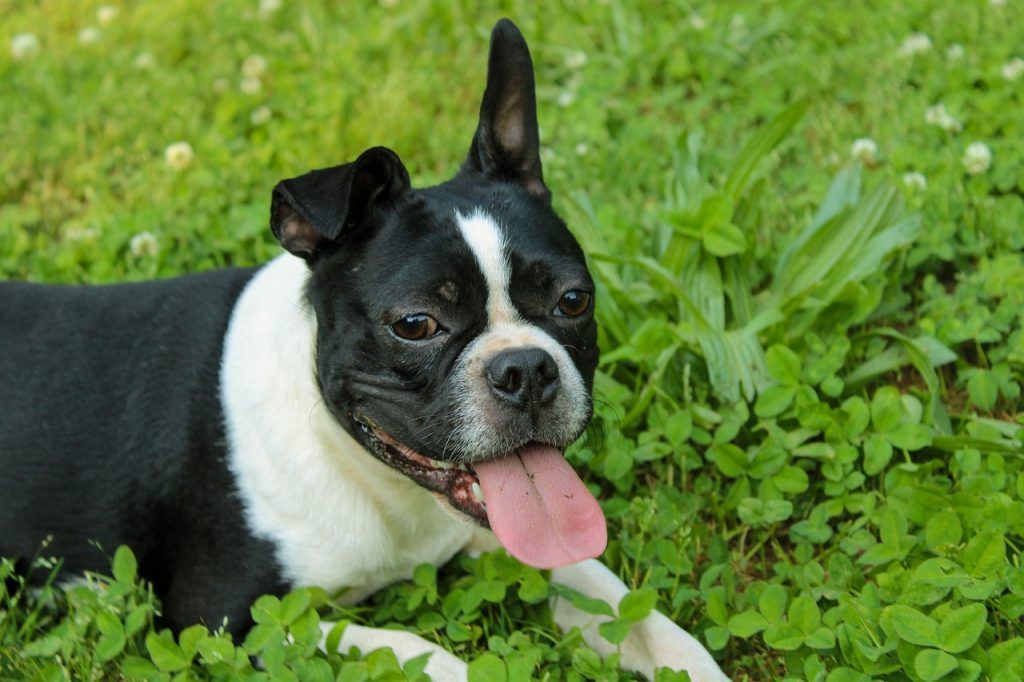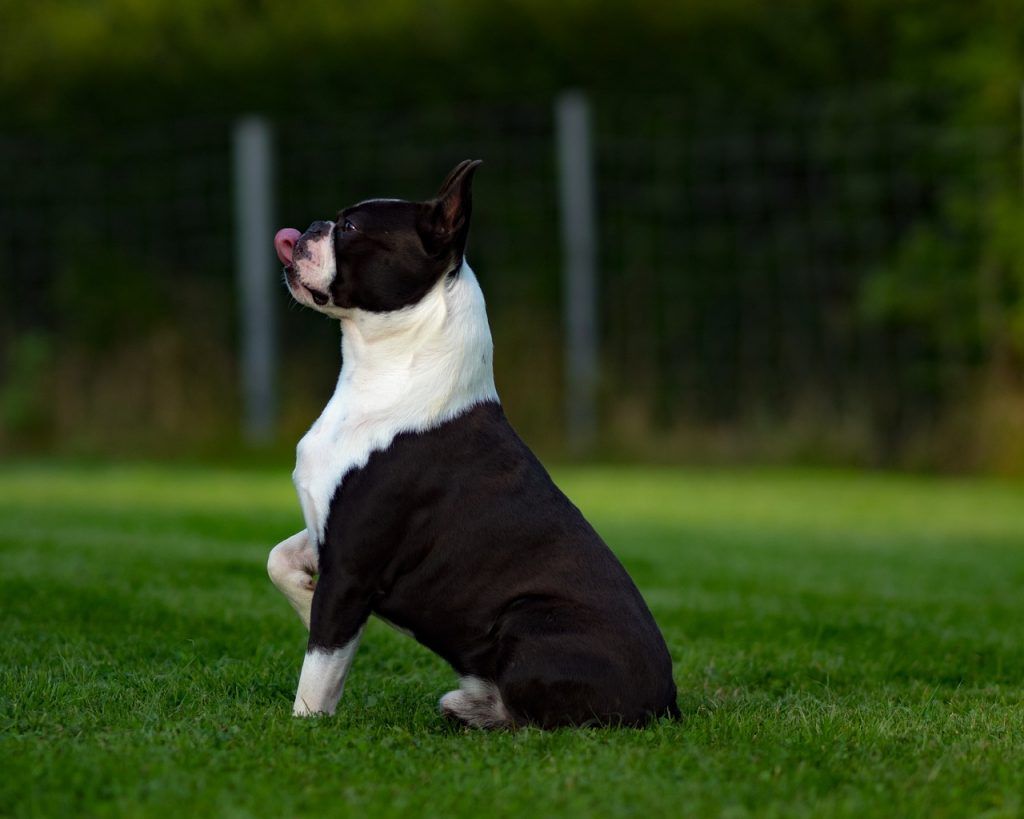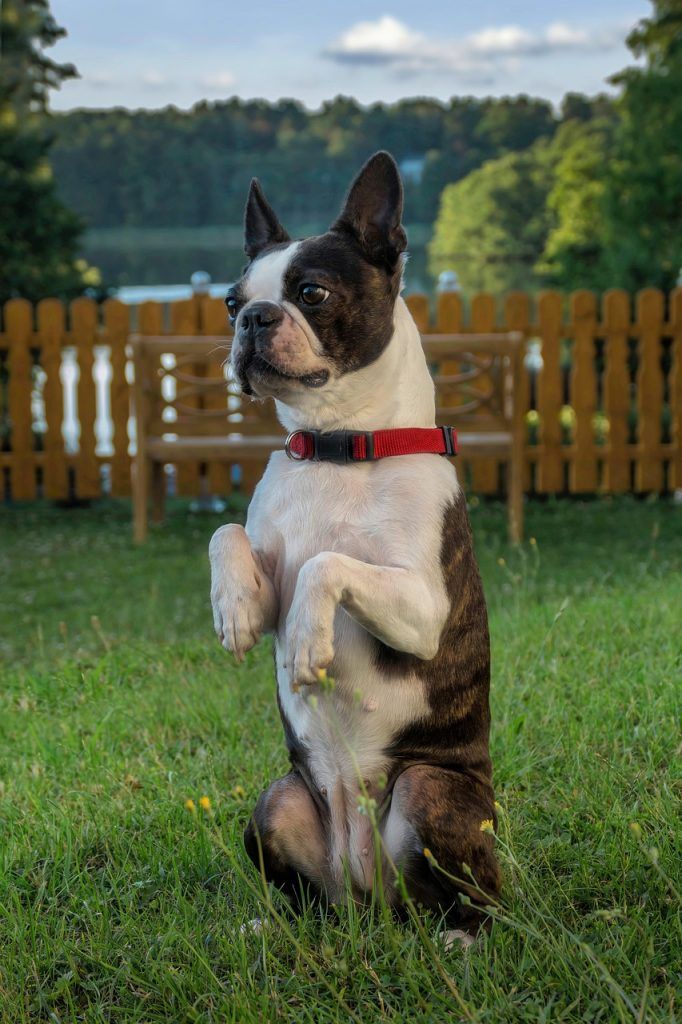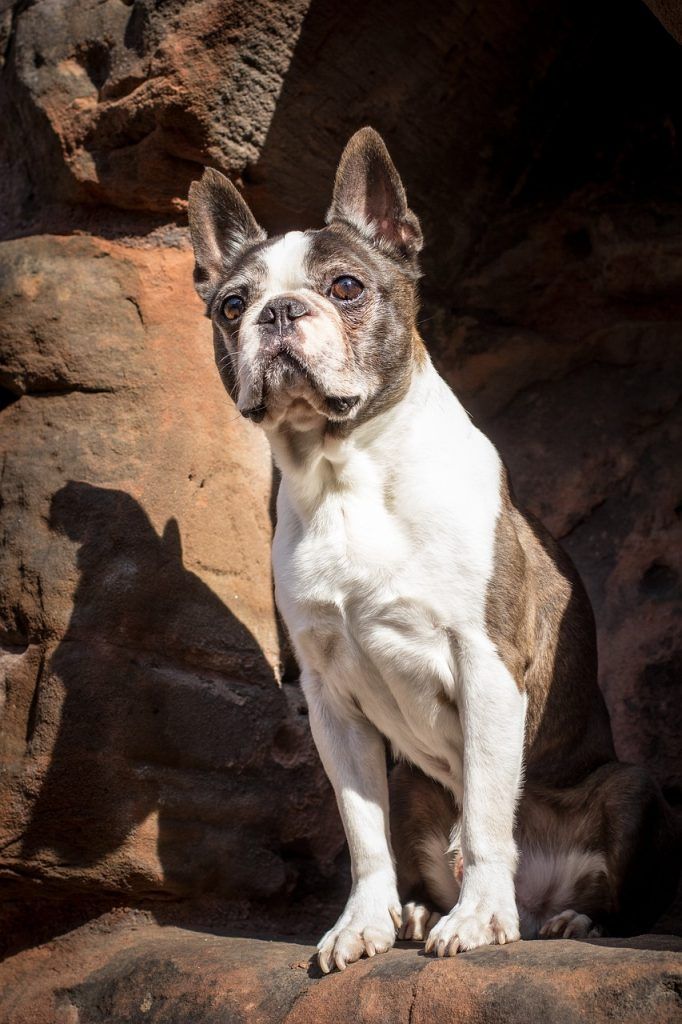Boston Terriers are small dogs with big personalities. They are affectionate, intelligent, and playful, making them ideal companions for families, singles, and seniors. They are also easy to groom, train, and care for as long as they get enough attention and exercise. In this article, we will explore this charming breed’s history, characteristics, health issues, and care tips.
Boston Terrier Breed History: From Fighting Dogs to Friendly Pets
The Boston Terrier is one of the few breeds that originated in the United States. It was developed in Boston, Massachusetts, in the late 19th century by crossing English Bulldogs with white English Terriers. The original sire of the breed was a dog named Judge, who Robert C. Hooper owned. Judge was a muscular and agile dog who weighed about 32 pounds. He was bred with a smaller female named Gyp, who belonged to Edward Burnett. The offspring of Judge and Gyp were the ancestors of the modern Boston Terrier.
The original role of the Boston Terrier was to be a fighting dog, but it soon became apparent that they had a gentle and friendly temperament that made them unsuitable for such a purpose. Instead, they became popular as pets and companions for the upper class. They were also admired for their intelligence and ability to learn tricks. In 1891, a group of enthusiasts formed the American Bull Terrier Club to promote the breed. However, the name was changed to Boston Terrier Club of America in 1893 after objections from Bulldog and Bull Terrier fanciers. The breed was also officially recognized by the American Kennel Club (AKC) in 1893.
Breed Overview
| Dog Breed | Boston Terrier |
|---|---|
| Nicknames | The American Gentleman, Boston Bull, Boston Bull Terrier |
| Coat | Short and fine |
| Coat Colors | Black, brindle, or seal (a dark brownish-black), all with white markings |
| Coat Patterns | Tuxedo-like or standard (white muzzle band, white blaze between the eyes, white forechest, and white on part or whole of the front and/or hind legs) |
| Weight | 10 to 25 pounds |
| Height | 15 to 17 inches at the shoulder |
| Lifespan | 11 to 15 years |
| Origin | Boston, Massachusetts, USA |
| Breed Ranking | 24th out of 199 breeds by the AKC in 2022 |
Appearance and Temperament
The Boston Terrier is a small dog that typically weighs between 10 and 25 pounds and stands between 15 and 17 inches at the shoulder. It has a short and fine coat that comes in three standard colors: black, brindle, or seal (a dark brownish-black), all with white markings on the chest, face, neck, and legs. The coat color is determined by the presence or absence of a gene called K locus, which affects the pigmentation of the hair. Some Boston Terriers may have other coat colors, such as red, blue, cream, or fawn, but these are not accepted by the AKC and are considered faults.
The Boston Terrier has a distinctive appearance that is often described as “tuxedo-like” or “gentleman-like.” It has a square head with a flat skull and a short muzzle that is slightly upturned. It has large, round eyes set wide apart and dark in color. It has small and erect ears that are either cropped or left natural. It has a short tail that is either straight or curled over the back. It has a compact, muscular body with a broad chest and a slightly arched back. It has short and straight legs with well-defined muscles.
The Boston Terrier has a lively and expressive personality that matches its appearance. It is affectionate, loyal, and eager to please its owner. It is also intelligent, curious, and playful. It loves to learn new things and perform tricks for attention and praise. It is generally friendly with people and other animals but may be wary of strangers or aggressive with other dogs if not socialized properly. It is also sensitive to its owner’s mood and may try to cheer them up if they are sad or stressed.

Common Health Issues with Boston Terriers
The Boston Terrier is prone to certain health issues primarily due to their size and build. Some of these include:
- Eye problems: The Boston Terrier’s large and protruding eyes make it vulnerable to injuries, infections, ulcers, glaucoma, cataracts, cherry eye (a condition where the third eyelid prolapses), dry eye (a condition where the tear glands do not produce enough tears), or entropion (a condition where the eyelids roll inward). Owners should check their dog’s eyes regularly for any signs of irritation or discharge and consult a veterinarian if they notice any problems.
- Brachycephalic syndrome: The Boston Terrier’s short muzzle can cause breathing difficulties due to narrow nostrils, elongated soft palate, or collapsed trachea. This can lead to snoring, panting, wheezing, gagging, or choking. Owners should avoid exposing their dogs to extreme heat, cold, stress, or exercise that can exacerbate the condition. They should also monitor their dog’s weight and diet, as obesity can worsen the symptoms. In some cases, surgery may be required to correct the anatomical defects.
- Patellar luxation: The Boston Terrier’s short legs can cause the kneecap to slip out of place, causing pain, limping, or difficulty walking. Trauma, congenital defects, or degenerative changes can cause this. Owners should avoid letting their dogs jump from high places or run on slippery surfaces. They should also provide their dog with regular exercise and joint supplements to maintain muscle strength and joint health. In some cases, surgery may be needed to stabilize the kneecap.
- Deafness: The Boston Terrier’s coat color can affect its hearing ability, as dogs with white or light coats are likelier to be deaf or partially deaf. This is due to a lack of pigment in the inner ear that affects the development of the auditory nerves. Owners should test their dog’s hearing at an early age and train them with visual cues and hand signals if they are deaf or hard of hearing.
- Cesarean section: The Boston Terrier’s small pelvises and large heads can make natural birth difficult or impossible for some females. If complications arise, owners should consult a veterinarian before breeding their dog and be prepared for a possible cesarean section.

Caring for a Boston Terrier
The Boston Terrier is a low-maintenance breed that does not require much grooming or exercise. However, owners should still provide their dogs with basic care to ensure their well-being.
Grooming
The Boston Terrier’s short coat does not shed much, but it still needs to be brushed once or twice a week to remove dead hair and dirt. Owners should use a soft-bristled brush or a rubber glove to gently massage the coat and distribute the natural oils. They should also check the ears for any signs of infection or wax buildup and clean them with a cotton ball and a mild ear cleaner if needed.
Bathing
The Boston Terrier does not need frequent baths, as this can dry out its skin and coat. Owners should only bathe their dog when it is dirty or smelly, using mild shampoo and warm water. They should also dry the dog thoroughly with a towel and avoid getting water in its ears or eyes.
Nail Trims
The Boston Terrier’s nails grow fast and need to be trimmed regularly to prevent them from cracking, splitting, or injuring the dog or its owner. Owners should use a nail clipper or a grinder designed for dogs and cut the nails just below the quick (the pink part of the nail that contains blood vessels and nerves). They should also file the edges to smooth them out and prevent snagging.

Dental Care
The Boston Terrier’s lower jaw protrudes beyond its upper jaw, creating an underbite that can cause dental problems such as plaque, tartar, gingivitis, or tooth loss. Owners should brush their dog’s teeth daily with a toothbrush and toothpaste made for dogs and provide them with dental chews or toys to help clean their teeth. They should also visit a veterinarian regularly for professional dental cleaning and checkup.
Diet and Nutrition
The Boston Terrier’s diet should be balanced and appropriate for its age, size, activity level, and health condition. Owners should feed their dogs high-quality dry or wet food that meets their nutritional needs and avoid giving it human food that can cause obesity, allergies, or digestive issues. They should also always provide their dog with fresh water and wash its bowls daily.
Exercise
The Boston Terrier is an energetic and playful dog that needs moderate exercise to stay fit and happy. Owners should provide their dogs with at least 30 minutes of physical activity per day, such as walking, jogging, playing fetch, or agility training. They should also provide their dog with mental stimulation, such as puzzle toys, interactive games, or obedience training. They should avoid overexerting their dog or exposing it to extreme temperatures, as this can cause breathing problems or heatstroke.
Boston Terrier Fun Facts: Did You Know?
The Boston Terrier is a fascinating breed with many interesting facts. Here are some of them:

- The Boston Terrier is nicknamed “The American Gentleman” because of its tuxedo-like appearance and refined manners.
- The Boston Terrier has been the official state dog of Massachusetts since 1979.
- The Boston Terrier was one of the first breeds to be recognized by the AKC in 1893.
- The Boston Terrier is ranked 24th in the AKC breed popularity ranking out of 199 breeds as of 2022.
- The Boston Terrier was one of the first breeds to participate in dog shows in America.
- The Boston Terrier Club of America, which was founded in 1891, is one of the first breed clubs in America.
- The Boston Terrier is a hypoallergenic breed that does not shed much and produces less dander than other dogs. However, no dog is completely allergen-free, and some people may still be allergic to the Boston Terrier’s saliva or urine. Owners should consult an allergist before getting a Boston Terrier if they have allergies or asthma.
- The Boston Terrier is a love bug that enjoys cuddling and kissing its owner. It is also known for making funny noises, such as snorting, snoring, grunting, or farting. Owners should not be alarmed by these sounds, as they are normal for the breed and do not indicate any health problems.
- The Boston Terrier is a versatile dog that can adapt to different lifestyles and environments. It can live in an apartment or a house as long as it gets enough exercise and attention. It can also get along with children, seniors, cats, and other dogs, as long as it is socialized properly from an early age.
Where to Buy a Boston Terrier: How to Find a Reputable Breeder
If you want a Boston Terrier, you may wonder where to find one and how much it will cost. The Boston Terrier is a popular breed that is not very rare but also not very common; they fall somewhere in the middle. This means that you may have to research and wait for a while before finding a suitable puppy.
The average price of a Boston Terrier puppy ranges from $600 to $1,200, depending on the breeder. However, some puppies may cost more or less than this range.
The best way to find a Boston Terrier puppy is to contact a reputable breeder who is registered with the AKC or the Boston Terrier Club of America (BTCA). A reputable breeder will provide you with health certificates, vaccination records, and pedigree papers for the puppy and its parents. They will also allow you to visit their facility and meet the puppy and its parents before you make a decision. They will also ask you questions about your lifestyle, experience, and expectations to ensure that you are a suitable owner for their puppy.
You can find a list of reputable breeders on the AKC or BTCA websites. You can also ask for referrals from your veterinarian, friends, or local dog clubs.
Before you buy a Boston Terrier puppy, you should also consider adopting one from a rescue or shelter. Many Boston Terriers need a loving home for various reasons, such as abandonment, abuse, neglect, or owner surrender. You can find a list of rescue organizations on the BTCA website or by searching online. Adopting a Boston Terrier can be rewarding and fulfilling, as you will be giving a second chance to a dog that deserves it.
Conclusion: Why You Should Get a Boston Terrier
The Boston Terrier is a wonderful dog that can make anyone happy with its lively and lovable personality. It is easy to care for, train, and groom, making it suitable for novice or experienced owners. It is also healthy, hypoallergenic, and adaptable, making it suitable for different living situations and family types. If you are looking for a loyal, intelligent, and playful companion that will always make you smile, the Boston Terrier may be the perfect choice for you.
More Dog Breeds
If you’re interested in learning about similar dog breeds, check out:
Or browse our Dog Breed articles!
FAQ
Do Boston Terriers shed?
Boston Terriers have a short and fine coat that does not shed much. However, they still need regular brushing to remove loose hair and dirt. They also need occasional bathing to keep their coat clean and shiny.
What is a Boston Terrier?
A Boston Terrier is a small dog breed that originated in Boston, Massachusetts, in the late 19th century. It is a cross between an English Bulldog and an English White Terrier. It is known for its tuxedo-like appearance, friendly personality, and intelligence.
How big is a Boston Terrier?
A Boston Terrier is a small dog that weighs between 10 and 25 pounds and stands between 15 and 17 inches at the shoulder. It has a compact, muscular body with a square head and short tail.
When do Boston Terriers’ ears stand up?
Boston Terriers’ ears usually stand up naturally when they are between 6 and 12 weeks old. However, some puppies may have floppy ears that do not stand up on their own. In this case, owners can tape their ears to help them stand up or leave them as they are.
Is a Boston Terrier hypoallergenic?
A Boston Terrier is considered to be a hypoallergenic breed because it does not shed much and produces less dander than other dogs. However, no dog is completely allergen-free, and some people may still be allergic to the Boston Terrier’s saliva or urine. Owners should consult an allergist before getting a Boston Terrier if they have allergies or asthma.
























